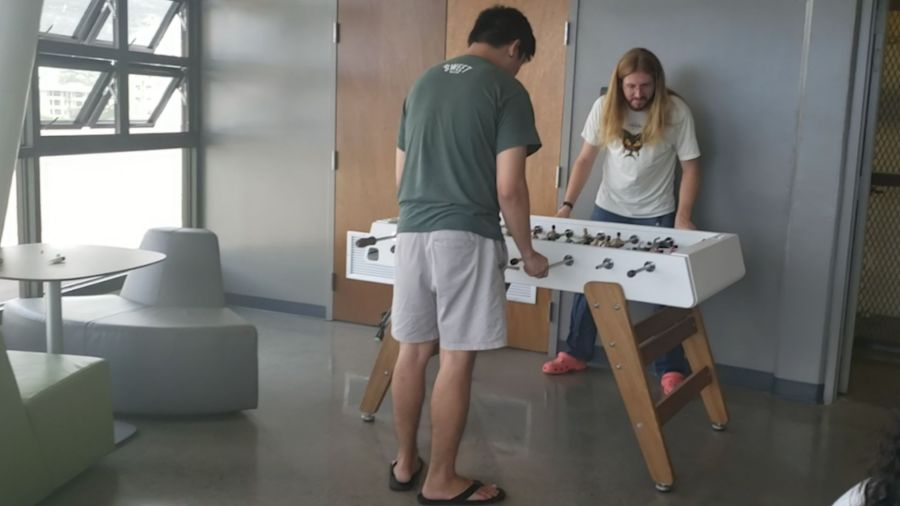HONOLULU (KHON2) — Starting college can be both exciting and intimidating. At the University of Hawaiʻi at Mānoa, often times new students face homesickness, culture shock and the challenge of finding community.
Helping them through those first months are resident assistants.
Makoa Miura, a resident assistant and associate residence director, remembers what it felt like to arrive on campus in 2021. Originally from Kapolei, he said his freshman year was difficult.
“I first became a resident assistant because I was having a really rough time my freshman year,” Miura said. “As a first-generation college student, navigating college was very different from how I navigated high school, and I really relied on my resident assistant.”
And that support he received from those investing in his future shaped his decision to take on the role himself.
“I wanted to make sure that I could go ahead and help them navigate their freshman year,” he said. “Especially those first-generation college students, so they wouldn’t have to face the same challenges I did.”
Learning from the campus and the land
For Miura, the heart of a meaningful college experience in Hawaiʻi lies in recognizing the reciprocal relationship between students and the place they now call home.
He emphasized that education is not a one-way exchange, but rather a responsibility to both learn from and contribute to the community:
“Some things students might not expect is how deeply intertwined the university is with the community that surrounds it,” he said. That includes partnerships with organizations that care for the land and environment.
Miura also stressed the importance of approaching Hawaiʻi’s culture with humility and genuine respect. He reminds students that their mindset matters when engaging with local traditions and perspectives:
“When you come here, and you are learning from the university, you are taking something from the islands. So, making sure that during your four years here, or longer, that you’re giving something back as well.”
Miura explained that engaging with Native Hawaiian culture requires more than surface-level participation. It’s about cultivating an attitude of humility, care and genuine interest.
He urged students to be mindful of how they enter cultural conversations and experiences.
“Just making sure that you’re approaching things from an area of an appreciation instead of appropriation,” Miura said. “Approaching different conversations oriented around Hawaiian culture through a lens of curiosity. Wanting to learn more about the place that you are currently residing in, and how you can give back.”
Beyond cultural respect, Miura highlighted how Native Hawaiian values like aloha and mālama ʻāina — love, compassion and care for the land — can serve as everyday guiding principles. He encouraged students to bring these values into every environment they enter.
“Any space you’re entering, either on campus or off campus, you’re making better than what it was when you first entered it.”
Building friendships and finding support
One of Miura’s biggest recommendations for new students is to take advantage of the programs hosted by residence halls.
These events, he explained, often become the starting point for building meaningful friendships and creating a sense of belonging on campus.
“At these programs are where a lot of people will meet their friends,” he said. “Sometimes they’re lifelong friends. It’s a great way just to bond with people over shared interests, maybe even if you’re trying something entirely new to you.”
He added that campus-wide events, such as late-night activities at the Campus Center, offer another opportunity for connection. These gatherings encourage students to step outside their routines and engage with peers from different backgrounds.
“It’s a great way to get out of your room, out of your shell, and kind of interact with other people from other backgrounds,” Miura said.
When students begin to feel the weight of homesickness, Miura emphasized that they don’t have to navigate it alone.
He pointed to the many resources available through residence life and across the university, to encourage students to seek support when they need it.
“We are a plethora of resources to you,” he said. “Depending on what challenges you might be facing… maybe a bit more professionally about the homesickness you’re feeling, we could go ahead and refer you to the counseling and student development center.”
Finding the right program
Miura emphasized that getting involved in student clubs and organizations can make a big difference in finding a sense of belonging at UH. He shared from his own experience how joining a program helped him connect with others and build community on campus.
“Something that’s really helped me is finding a program,” he said. “Just finding one can really help you find community.” His own path included joining the Native Hawaiian Science and Mentorship Program, which connected him with others in his field of study.
For Miura, that sense of connection came through the Native Hawaiian Science and Mentorship Program, which introduced him to peers in his field of study.
He also pointed to TRIO Student Support Services as another valuable resource, especially for first-generation students navigating college for the first time.
“They do a really good job at finding programs for students to come together and build community and people that you can kind of build a cohort with to navigate college together,” he added.
Adjusting to life at UH Mānoa requires more than learning where to go for class. It means giving back to the land, respecting Hawaiian culture, and building community.
Miura’s words point students toward the essentials: attend programs, join a club, talk to resident assistants and use resources early.
You can click here to learn about opportunities that can help you meet likeminded people on campus. You can click here to learn more about UH’s student housing facilities and opportunities.
For those who take those steps, college becomes a time not just of study but of connection, growth and belonging.
